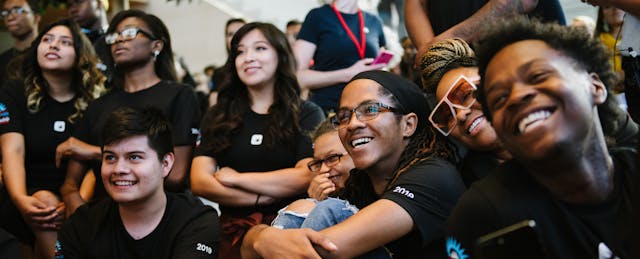CHICAGO — Six weeks ago, they barely knew how to code. But there they were last Thursday—19 students, showcasing their apps under the bright lights of an Apple store in downtown Chicago, in front of a standing room-only crowd that included Mayor Lori Lightfoot, Chicago Public Schools Superintendent Janice Jackson and Illinois Chief Information Officer Ron Guerrier.
The students were part of One Summer Chicago, a public-private partnership program that provides 32,000 Chicago youth, between the ages of 14 to 24, with paid summer jobs and internships. Two hundred of them participated in Everyone Can Code, an Apple-led education initiative done in collaboration with the mayor’s office, CS4All, Chicago Public Schools and the City Colleges of Chicago.
The Everyone Can Code program offers curriculum and exercises that introduce students to Apple’s programming language, Swift, and its development tools, xCode. They also learn to use an app design journal that provides a framework for building app prototypes.
The event provided students the chance to show what they had learned and built. But they weren’t the only ones who learned a new skill. Marcus Warren, an instructor at Westside Health Authority in the Austin neighborhood on the west side of the city, had no prior coding experience. But when the city’s Department of Family & Support Services approached his organization and presented the opportunity to partake in Everyone Can Code, he volunteered to become an instructor.
To Warren, the program was an opportunity to bring technical training to underrepresented communities: “I figured if I could learn it, I could teach it too.”
“Everyone Can Code was something new and fresh. We wanted to be on the cutting edge of programming for our youth,” Warren said. He recalled being struck by the lack of African American and Hispanic people in the technology industry. (As a percentage, they make up in the low to mid-teens of workers in math and computer occupations, a Brookings report recently estimated.) He was especially bothered by the even lower percentage of women of color in the field.

While the program is primarily about coding, Warren found that he spent half of his time focusing on teaching teamwork and social-emotional skills to help students develop a sense of confidence in their work.
“Building something, like a prototype that was an idea in their head, builds confidence,” said Warren. “Even though coding is challenging and intimidating, doing it gives students the confidence to do anything that is challenging and intimidating.”
What also helped was that the program tasked students with finding a deeper purpose for their work. They had to identify a pain point in their community before learning to program. The idea is that by finding something that is meaningful to their lives, students will be more invested in learning how coding can address that problem.
Students also learned how to pitch their apps. Before the event, about 40 teams across 11 Chicago sites presented to a team of judges comprised of members from Chicago Public Schools, city government officials and the business community. They then selected these three teams to present at Thursday’s showcase:
- Shield Hero: Affected by the U.S. Immigration and Custom Enforcement raids that took place in Chicago last year, this team developed a prototype of an app to help undocumented people understand their rights and what to say if ICE approached them, in both English and Spanish.
- Beans: The prototype helps users find sustainable and green businesses in the city. The app can help locate restaurants that serve vegetarian options or source from local farms. It can also locate buildings that are LEED-certified and businesses that engage in environmentally sustainable practices.
- Vance Loans: This prototype was born from the team members’ personal difficulties in finding favorable interest rates on loans, as young people who are not citizens or who don’t have a credit history do not qualify for good rates. The app facilitates peer-to-peer lending where investors can set the amount and interest rates for loan seekers.

In addition to the three teams, 10 other students worked with the City of Chicago and developed two app prototypes—called Get Off the Block and Wus Poppin—that list local activities to encourage their peers to explore their neighborhoods.
Sybil Madison, the deputy mayor of education and human services, said that supplementing classroom learning with educational opportunities outside of school hours is one of her passions. The One Summer Chicago program, she noted, is a prime example of the city’s effort to “work with all city agencies, corporations, and youth-serving organizations to get kids plugged in so they can explore different opportunities.”
“We want students to find out what they are jazzed about, connect to peers who are jazzed about the same things, and connect with adults who can be mentors,” Madison said, reiterating that an important goal for her office is making career pathways more visible and available for students.
Cynthia Suaste, a 20-year-old accounting major at Concordia University who helped build Vance Loans, had never coded before. But after hearing about Everyone Can Code from her sister-in-law (who is also an instructor for the program), she joined a workshop hosted at Central States SER, a workforce development and education organization in the Little Village neighborhood of Chicago. There, she teamed up with a high schooler who she credits with designing a polished user interface for their app.
“I took away a lot from this experience,” Suaste said, “particularly that youth have more power than they think. We shouldn’t limit ourselves.” The team wants to find funding for Vance Loans in hopes of bringing it to the app store.
Some students who participated in previous Everyone Can Code programs have continued to develop their skills at partnering businesses in the following summer. That’s the case for Abriel Simmons, a rising senior from the Pullman neighborhood who is currently an intern at Innovare Social Innovation Partners, a company that offers school planning and management tools. She worked with her team to build a mobile app prototype and interviewed school principals to make sure the app would address their pain points
Such opportunities and connections underscore the importance of programs like One Summer Chicago, said Chicago Mayor Lightfoot. “When we make these investments in young people, we show them that they are important … We aren’t just teaching kids to build software. This is helping students realize their God-given potential by creating opportunities for them.”


